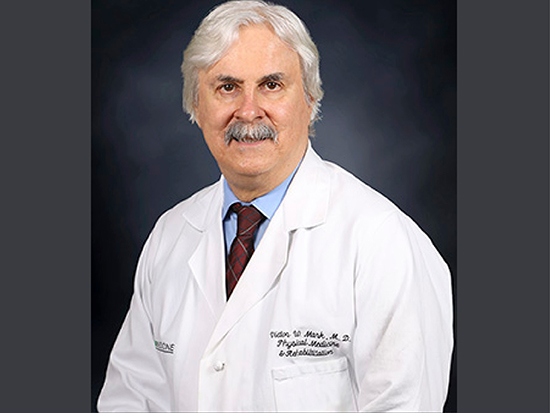 Victor Mark, M.D., Associate Professor for the University of Alabama at Birmingham Department of Physical Medicine and Rehabilitation, and UAB undergraduate students Elizabeth Rodriguez (Neuroscience) and Logan Calhoun (Biomedical Engineering) are evaluating the peripheral tissue changes of patients with Functional Neurological Disorder (FND). FND is a disabling disorder that involves intermittent loss of voluntary control over parts of the body, which alternates with periods of normal or nearly normal neurological control.
Victor Mark, M.D., Associate Professor for the University of Alabama at Birmingham Department of Physical Medicine and Rehabilitation, and UAB undergraduate students Elizabeth Rodriguez (Neuroscience) and Logan Calhoun (Biomedical Engineering) are evaluating the peripheral tissue changes of patients with Functional Neurological Disorder (FND). FND is a disabling disorder that involves intermittent loss of voluntary control over parts of the body, which alternates with periods of normal or nearly normal neurological control.
Although once thought to be a psychiatric disorder, recent research points to FND being instead a neurological disorder with abnormalities on research brain scans. Patients at the Spain Rehabilitation Center FND Clinic commonly have either paralysis of their limbs or face, or involuntary repetitive movements in these body areas.
“In our clinic, we commonly find abnormalities in the patients’ hands and feet,” explains Dr. Mark. “These include darkish, or dusky, color in the feet and hands, often with cold skin, and it takes an extended time for the color to turn back to normal after gentle compression. We also see many FND patients who are double-jointed at the knuckles.”
Dr. Mark is collaborating with the Alabama BRAIN Lab, which is located at UAB Medicine's Spain Rehabilitation Center. The group is video recording these parts of the body for the blood refilling time course and joint flexibility, and measuring the skin temperature changes through using infrared photography. They will similarly image persons without FND to understand to what extent these tissue changes may distinguish persons with FND. Confirming that peripheral tissue changes are common in FND patients may lead to new understanding the biological basis for this disorder. This in turn may suggest new methods for rehabilitation.
“The students learn very important lessons for clinical care, including listening empathetically to the patients, to endorse the severity of the disease for the patients,” Dr. Mark adds. “FND and other disorders are commonly seen by providers as being something ‘imaginary’ because patients lack distinctive changes on routine clinical brain scans or blood tests. This often leads patients to become socially isolated and drop out from medical care. The FND Clinic provides patients with medical support and referral for psychological and rehabilitation treatment that can improve their lives.”
This research is supported by the Alabama BRAIN Lab. Publishing of initial findings will be a stepping stone to support future funded clinical trials for treating FND.